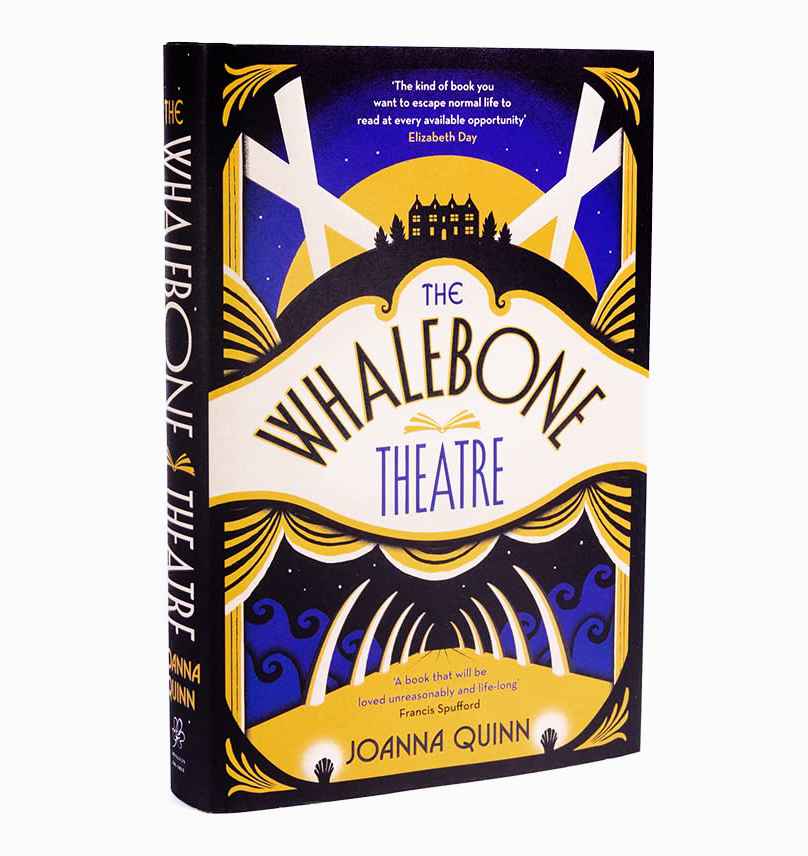Recently I was in Normandy, Northern France where we were based in the small town of Lisieux. I had heard of the saint: Therese of Lisieux but apart from that I was quite ignorant about the area. I learnt that in the Second World War the Allies bombed Lisieux as it was a vital point in the Nazi lines of communications. The town was flattened apart from the huge basilica, the cathedral and, strangely, my hotel. There were discussions about the Allied bombing of Normandy and Brittany in the bar after dinner. The history felt uncomfortable despite a clear understanding of why the bombing was deemed necessary. The civilian deaths were considerable.
And thus to the book. I had bought ‘The Whalebone Theatre’ in Waterstones at the behest of the girl at the cash desk. I am easily persuaded! It is over 500 pages long and so not the most sensible of books to take on holiday. However, I was immersed in the story and not prepared to leave it at home. I had no idea where the narrative would take me but in one of those strange coincidences a lot of it happens in Normandy during the war.
Over a cup of coffee, I had an interesting talk with a fellow traveller about why stories set in wartime, particularly the Second World War, continue to be so popular and sell so well. Do we feel that this is history that is just about within reach? Certainly, there are many still with first hand memories of that time. Maybe we are sobered by the thought of what might have been if the war had ended differently. Whatever, it definitely gives authors a very rich seam to mine, even if their story stays firmly in Britain.

So, The Whalebone Theatre is a multi-generational family novel which moves us from 1919 to the end of the 1940s and the years immediately after that war. We are introduced to a gently decaying country house in Dorset with a staff which is loyal but too small. The main characters are shackled by social mores and pushed into life roles that they find stultifying and unsatisfactory, whether it is a loveless second marriage in an attempt to produce an heir or becoming a wife because the alternative is to be an ‘old maid.’ The chances of this are of course increased immediately after the First World War. As happens after every war, there is a realignment of society and boundaries are blurred, particularly between classes. Maids train as car mechanics and post war they throw off their white aprons, learn to drive and find a freedom previously unthought of. Whatever experiences the characters have had during the war powerfully affect their expectations of what comes next.
I enjoyed the exploration of women’s place in society as this story unfolds. It reminded me of the Cazalet books by Elizabeth Jane Howard which I love and have read several times. (The books being far better than the TV adaptation.) If a story covers several generations, you begin to know the dynamics of the family really well. This happens in The Whalebone Theatre and is probably why the reader feels swallowed up by the book. Hence, I couldn’t leave it at home!
The title of the book refers to a beached whale that dies on the secluded beach that belongs to the house. Christabel (one of the 3 children in the family) is surprised to learn that dead whales belong to the king. However, as the whale decomposes and the monarch shows no interest, the sea washes the bones clean and the large rib bones are carried up to the estate where they are planted in the ground to become the framework for an outdoor theatre overlooking the sea that the children use for their productions. They have had no schooling apart from a variety of French governesses, but they have had free run of the library and grow up fed by stories which they dramatise in eccentric fashion.
You will enjoy this book if you like family sagas. There is sadness and comedy, great characterisation and careful research all set within the framework of the two world wars.
Joanna Quinn wrote this book over a period of 10 years and I would imagine her agent is hoping the next one doesn’t take quite so long.
I can’t leave this until the December Outlook as it will then be too late. I need to tell you about ‘The Christmas Mystery’ by Jostein Gaarder. A gorgeous pre-Christmas read that is like an advent calendar in text; 24 parts. I like to read one a day but it can of course be read anyway you choose. Great for anyone over about 10.
Happy Reading
